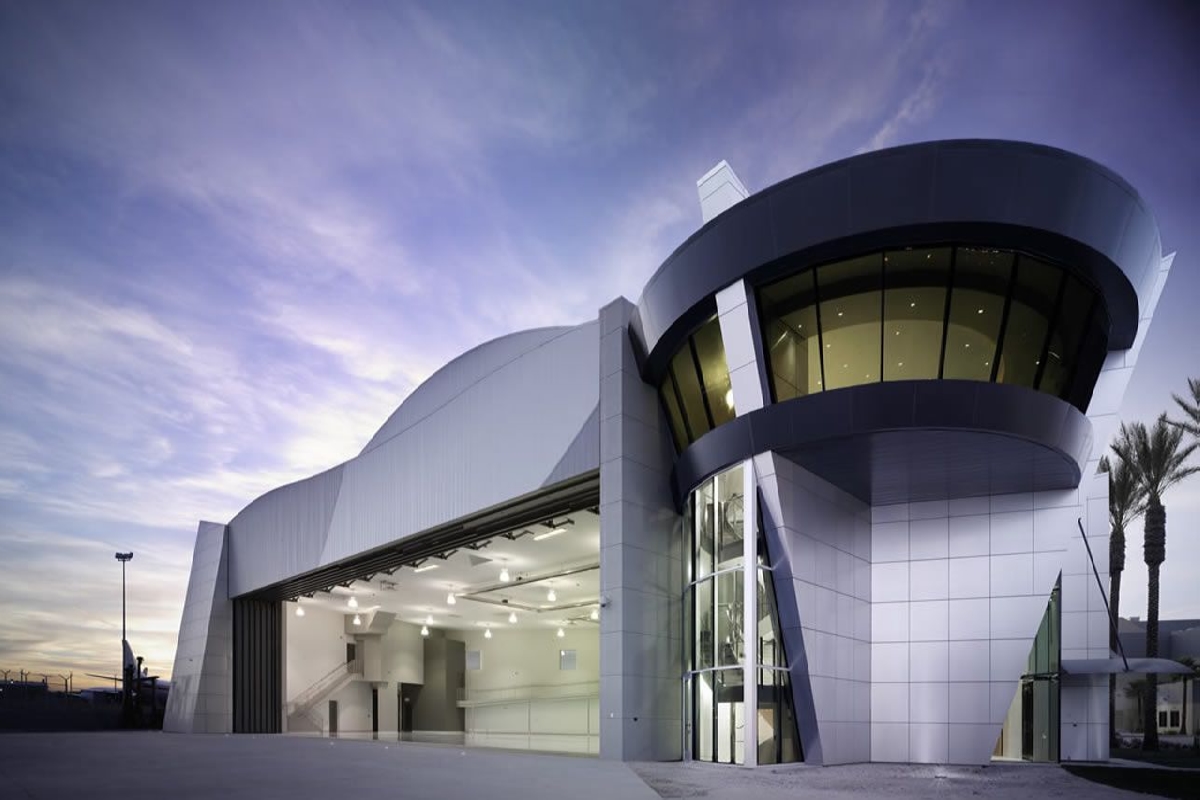Private jet hangar: Have you ever wondered where aircraft storage for elite flight departments is located? Well, look no further than private jet hangars. These exclusive facilities are more than just garages for planes.
They are a symbol of luxury and convenience in the world of aviation. Private jet hangars serve a clear purpose: to provide a secure and sheltered space for business jets and airplanes.
A private jet hangar is a secure and enclosed facility where private jets are stored and maintained. It provides shelter, security, and amenities for aircraft owners.
Hangars typically have maintenance areas, fueling stations, and storage spaces for equipment and supplies, ensuring the proper care and protection of the aircraft.
These expansive structures offer protection from the elements, ensuring that these magnificent flying machines in the business aviation industry remain in pristine condition. But their significance goes beyond mere storage.
For business jet owners, having access to a dedicated hangar is essential in the world of business aviation. It not only provides peace of mind but also offers privacy and exclusivity for their planes.
Imagine being able to arrive at your personal hangar, away from prying eyes, and embark on your business journey without any interruptions or delays in parking your business jets.
We’ll explore the importance of private hangars to plane owners, uncover the benefits they bring to construction and lease areas, and shed light on some lesser-known facts about these remarkable structures.
Whether you’re a seasoned aviation enthusiast or simply curious about high-flying lifestyles, join us as we take off into the realm of private hangars.
So fasten your seatbelts as we venture into the domain where luxury meets functionality—the world of private jet hangars. Whether you need aircraft storage, want to lease a hangar, or require construction services, Banyan Air has got you covered.
The Growing Demand for Private Jet Hangars
Private jet ownership has seen a significant increase in recent years, leading to a growing demand for private jet hangars.
More individuals and companies are investing in their own aircraft, seeking the convenience, flexibility, and luxury that comes with private air travel.
With the rising popularity of private jets, the need for suitable storage and parking facilities, specifically private jet hangars, has also surged.
Owning a private jet offers numerous advantages over commercial air travel. It allows individuals to bypass crowded airports, long security lines, and inconvenient flight schedules.
For businesses, owning a private jet enables executives to travel efficiently between locations while maintaining productivity during transit. As more people recognize these benefits, the market for private jets continues to expand.
With the increasing demand for private jets, the need for aircraft storage is also on the rise. Many private jet owners are opting for spacious hangars that can accommodate their aircraft.
These hangars can be as large as several thousand square feet and provide a secure and convenient storage solution throughout the year.
Rise in Demand for Secure Storage and Parking Facilities
One of the key factors driving the demand for private jet hangars is the need for secure storage and parking facilities.
Private jet owners value the safety and protection offered by dedicated hangars compared to leaving their expensive aircraft exposed on open ramps or shared spaces.
Hangars provide shelter from harsh weather conditions such as rain, snow, hailstorms, or extreme temperatures that could potentially damage an aircraft. The demand for private jet hangars has been increasing steadily over the past few years.
Moreover, storing an aircraft in a hangar at WestJet Air Center reduces the risk of theft or vandalism compared to leaving it unattended on an open tarmac.
Hangars offer enhanced security measures such as restricted access control systems and surveillance cameras that deter unauthorized entry or tampering.
With over [sq] feet of space available, WestJet Air Center provides secure aircraft storage for private jets.
Factors Contributing to the Surge in Demand for Private Jet Hangars
Several factors, including the increasing need for aircraft storage, the limited availability of hangar space, and the growing popularity of private jet travel, have contributed to the surge in demand for private jet hangars in recent years.
These hangars offer ample sq ft of space for aircraft storage and are often located within an FBO facility, providing convenient access to various services and amenities for private jet owners and operators.
- Increased Affordability: The decreasing costs associated with private jet ownership have made it more accessible to a wider range of individuals and businesses. This affordability has led to an influx of new buyers entering the market.
- Growing Awareness: As the benefits of private jet travel become more widely known, individuals and companies are increasingly considering ownership as a viable option. The convenience, time-saving advantages, and personalized experience offered by private jets have captured the attention of many potential buyers.
- Customization and Comfort: Private jet owners can tailor their aircraft to suit their specific needs and preferences. From luxurious interiors to advanced entertainment systems, private jets provide a level of customization and comfort that commercial airlines cannot match. This exclusivity has fueled the desire for private jet ownership.
- Flexibility and Efficiency: Private jets offer unparalleled flexibility in terms of flight schedules and destinations. They can access smaller airports with limited commercial service, allowing passengers to reach their final destinations more efficiently. This flexibility is particularly appealing for business travelers who value time-saving options.
- Privacy and Security: Private jet travel provides a higher level of privacy compared to commercial flights, making it an attractive choice for high-profile individuals or those who require confidentiality during their travels. With growing concerns over safety and security, private jet hangars offer an added layer of protection for both passengers and aircraft.
Reasons Behind the Surge in Private Aircraft Fleet
Private jet ownership has experienced a significant surge in recent years, thanks to advancements in aviation technology.
The introduction of new aircraft models with enhanced capabilities and improved efficiency has made private jets more accessible to a wider range of individuals.
These technological advancements have not only increased the affordability of private jets but have also made them a more attractive option for those who value convenience and luxury.
With the development of cutting-edge technologies, modern private jets now offer superior comfort, safety, and performance compared to their predecessors.
State-of-the-art avionics systems provide pilots with advanced navigation tools for smoother flights and improved overall travel experiences.
These private jets are equipped with innovative features such as noise reduction systems, luxurious interiors, and advanced entertainment options, all within a spacious interior of up to thousands of sq ft.
The introduction of new aircraft models has also led to improvements in fuel efficiency, reducing both costs and environmental impact.
These advancements allow private jet owners to enjoy the benefits of flying privately while minimizing their carbon footprint.
As sustainability becomes an increasingly important consideration for individuals around the world, the appeal of owning a private jet that aligns with eco-friendly practices has grown substantially.
Growing affluence leading to increased ownership of luxury assets like private jets
Another significant factor contributing to the surge in private aircraft fleet is the growing affluence among individuals worldwide.
As wealth continues to concentrate within certain segments of society, there has been an increase in luxury asset ownership, including private jets.
Affluent individuals are seeking ways to differentiate themselves from others and indulge in exclusive experiences that reflect their status.
Owning a private jet has become a symbol of prestige and success for many high-net-worth individuals who desire unparalleled comfort and privacy during their travels.
It offers them the freedom to fly at their own convenience without being bound by commercial flight schedules or crowded airports.
The exclusivity and personalized service provided by private air travel cater to the discerning tastes of the affluent, making it an attractive investment for those who can afford it.
With its spacious interiors and luxurious amenities, a private jet provides the ultimate in comfort and convenience, allowing passengers to travel in style with ample sq ft of space.
Benefits offered by private air travel compared to commercial airlines
Private air travel offers a myriad of benefits that set it apart from traditional commercial airlines. One of the most significant advantages is the unparalleled level of convenience and time-saving opportunities it provides.
Private jet owners have the flexibility to depart from smaller, less congested airports, which eliminates the need for long security lines and extensive check-in procedures.
This allows travelers to arrive closer to their desired destinations, saving valuable time that would otherwise be wasted in transit.
Moreover, private jets offer a higher degree of privacy and comfort compared to commercial flights. Passengers can enjoy spacious cabins designed with luxurious interiors tailored to their preferences, with an average size of 500 sq ft.
They have full control over their environment, allowing them to work, relax or socialize in complete privacy without distractions.
Private jet passengers experience personalized service from dedicated flight attendants who ensure every aspect of their journey is tailored to their needs.
In light of recent events such as the COVID-19 pandemic, private air travel has gained even more traction due to health and safety concerns associated with crowded airports and airplanes.
Private jets provide a controlled environment with limited contact points, reducing exposure risks significantly.
This added layer of protection has further fueled the surge in private aircraft fleet as individuals prioritize their well-being while traveling.
Challenges Faced by Private Jet Owners in Finding Hangar Space
Finding suitable hangar space for private jets can be a daunting task for owners. One of the major challenges they face is the limited availability of hangar space at airports.
With an increasing number of private jet owners and a limited number of hangars, the demand often outweighs the supply.
This scarcity leads to fierce competition among owners vying for a spot to store their prized aircraft. Private jet owners are often left with few options.
They may have to settle for inferior locations or compromise on other factors such as security or convenience. Some even resort to storing their aircraft in distant airports, which can be inconvenient and time-consuming.
Competition among private jet owners for existing hangar slots
The competition among private jet owners for existing hangar slots adds another layer of complexity to finding suitable storage space.
As more individuals invest in private jets, the demand for hangar slots continues to rise while the supply of available sq ft remains limited.
This creates intense competition and makes it challenging for owners to secure a spot in a desirable location.
Private jet owners often find themselves competing against each other, trying to outbid and outmaneuver their rivals in order to secure a coveted hangar slot.
This competitive environment can drive up prices and make it even more difficult for individual owners, especially those with smaller budgets, to find affordable and convenient storage options.
High costs associated with leasing or purchasing a dedicated hangar
Leasing or purchasing a dedicated hangar with enough sq ft is undoubtedly one of the biggest challenges faced by private jet owners. The costs involved can be exorbitant, making it financially burdensome for many individuals.
The expense not only includes the initial investment but also ongoing maintenance fees, insurance premiums, and property taxes.
For those considering leasing private hangars, monthly rental fees for private planes can quickly add up over time.
Leasing agreements for private hangars often come with strict terms and conditions that may limit the owner’s flexibility or require long-term commitments.
On the other hand, purchasing a dedicated private hangar involves a substantial upfront cost and can tie up a significant amount of capital.
Private jet owners must carefully weigh the financial implications before deciding on leasing or purchasing a hangar. They need to consider their budget, long-term plans for aircraft ownership, and potential returns on investment.
Solutions to Overcome Hangar Availability Issues
One innovative solution to tackle the challenge of hangar availability is through collaborative sharing arrangements between multiple aircraft owners.
Instead of individual owners each having their own private jet hangar, this approach allows them to share a common space, reducing costs and maximizing efficiency.
By pooling resources and sharing the expenses associated with hangar space, private plane owners can enjoy significant savings while still ensuring their jets are safely stored.
This collaborative model not only helps address the scarcity of available hangars but also fosters a sense of community among like-minded individuals who share a passion for private planes.
Imagine the possibilities! You could form a group with other jet owners who have similar usage patterns or geographical locations.
Together, you could lease or build a shared private jet hangar that meets everyone’s needs, whether it’s for small jets or larger ones with more sq ft.
This arrangement allows you to split costs such as construction, maintenance, security, and utilities among all participants.
Furthermore, collaborative sharing arrangements provide an opportunity for networking and collaboration within the aviation industry.
By interacting with fellow private plane owners on a regular basis, you may discover new business opportunities or even forge valuable partnerships.
It’s like having your own exclusive club where you can exchange ideas and experiences while enjoying the convenience of shared private hangar facilities.
Construction of New Hangars: Meeting Rising Demand Head-On
Another effective solution to combat the shortage of private jet hangars is by investing in new construction projects at airports.
With air travel becoming increasingly popular and more individuals opting for private jets, there is an urgent need to expand infrastructure to accommodate this growing demand.
One way to address this issue is by constructing additional hangars with larger square footage to accommodate more private jets.
These developers possess the expertise required to design and build efficient hangars that meet all safety regulations while optimizing space utilization, including maximizing sq ft.
The advantage of constructing new hangars for private planes is twofold. Firstly, it directly addresses the lack of available space for private plane owners to store their jets securely.
Secondly, it stimulates economic growth in the aviation sector, creating job opportunities and attracting new businesses to the area.
By investing in hangar construction projects, airports can position themselves as attractive destinations for private jet owners.
This not only benefits local economies but also enhances the overall aviation experience by ensuring there are ample facilities to cater to the increasing number of private jet travelers.
Outsourcing Aircraft Storage and Maintenance: Expert Solutions at Your Fingertips
Outsourcing aircraft storage and maintenance services to specialized companies is an alternative solution that offers numerous advantages for private jet owners facing hangar availability issues.
These companies specialize in providing secure storage facilities along with comprehensive maintenance services tailored specifically for private jets.
By entrusting your aircraft to a reputable storage and maintenance provider, you can rest assured knowing that experts are taking care of all your needs.
These companies have dedicated hangars equipped with advanced security systems, climate control features, and regular maintenance programs to ensure your jet remains in top condition.
Moreover, outsourcing these services allows you to focus on what matters most – flying!
Instead of worrying about hangar availability or spending valuable time coordinating maintenance tasks yourself, you can rely on professionals who have years of experience in managing private jet operations.
Outsourcing provides access to a wide range of supplementary services such as fueling, concierge assistance, and even charter arrangements when needed.
This comprehensive approach ensures that every aspect of owning a private jet is handled seamlessly by industry experts.
Benefits of Private Jet Hangars for Aircraft Storage and Parking
Private jet hangars offer a crucial advantage. Hailstorms, extreme temperatures, heavy rain, and strong winds can wreak havoc on an exposed aircraft, leading to costly repairs or even rendering it temporarily out of service.
By storing your private jet in a hangar, you ensure that it remains shielded from these elements, minimizing the risk of damage and preserving its pristine condition.
Enhanced security measures
When you own a valuable asset like a private jet, security becomes paramount. Private jet hangars provide enhanced security measures that go beyond what is typically available in open-air parking areas.
These hangars are equipped with advanced surveillance systems, including CCTV cameras and motion sensors, ensuring round-the-clock monitoring of your aircraft.
Access to the hangar is restricted to authorized personnel only, reducing the risk of theft or vandalism.
Convenience and time-saving benefits for frequent flyers
For frequent travelers who rely on their private jets for business or leisure purposes, having easy access to their aircraft is essential.
Private jet hangars offer unparalleled convenience by providing direct access to your plane without the need for lengthy walks across tarmacs or waiting in crowded terminals.
This saves precious time and allows you to quickly embark on your journey or disembark upon arrival.
Furthermore, private jet hangars often come equipped with additional amenities such as lounges and comfortable waiting areas where passengers can relax before their flight.
These facilities provide a more personalized experience compared to traditional airport environments.
Exploring the Convenience and Security Offered by Private Jet Hangars
Private jet hangars offer a significant advantage. Unlike commercial airports, private jet hangars are strategically located in close proximity to airport terminals.
This means that travelers can avoid the long queues, security checks, and crowded waiting areas typically associated with commercial air travel.
By having private jet hangars situated near airport terminals, passengers can enjoy seamless and efficient boarding processes.
They can arrive at the hangar just minutes before their flight departure time, eliminating the need for early check-ins and lengthy pre-flight procedures.
This convenience allows travelers to make the most of their valuable time, ensuring they reach their destinations quickly and efficiently.
Furthermore, being close to airport terminals enables private jet owners and operators to easily access other aviation services.
Whether it’s refueling, maintenance, or additional passenger services, having a private jet hangar nearby streamlines these processes.
It eliminates unnecessary delays often encountered at commercial airports due to limited resources or busy schedules.
Advanced surveillance systems providing round-the-clock security
One of the key factors that make private jet hangars highly appealing is the advanced surveillance systems they employ.
These state-of-the-art security measures ensure round-the-clock protection for both aircraft and passengers.
Private jet hangars utilize cutting-edge technologies such as CCTV cameras, motion sensors, and access control systems to monitor every corner of the facility.
This comprehensive surveillance network acts as a deterrent against potential threats while allowing immediate response in case of any suspicious activities.
Moreover, some private jet hangars employ dedicated security personnel who are trained in handling various emergency situations effectively.
Their presence adds an extra layer of protection and reassurance for those utilizing these facilities.
With advanced surveillance systems in place, private jet owners can have peace of mind knowing that their valuable assets are safeguarded throughout their stay in the hangar.
This level of security is particularly crucial for high-profile individuals, corporate executives, and VIPs who prioritize privacy and confidentiality.
Dedicated staff offering personalized services tailored to individual needs
Private jet hangars go beyond providing a secure parking facility for private jets; they also offer a range of personalized services tailored to individual needs.
These dedicated staff members are committed to delivering exceptional experiences for their clients.
From the moment passengers arrive at the hangar, they are greeted by friendly and professional staff who ensure a smooth transition from ground to air.
These experts understand that every traveler has unique preferences and requirements. They strive to accommodate these needs by offering personalized assistance throughout the journey.
The dedicated staff can arrange various services such as catering, ground transportation, and concierge services according to the passengers’ requests.
Whether it’s arranging a special meal onboard in the private hangar or organizing transportation upon arrival to the private hangar, these professionals take care of every detail, ensuring a hassle-free experience.
Private jet hangars often provide luxurious amenities within their facilities. Passengers can enjoy comfortable lounges, well-equipped conference rooms, and even private sleeping quarters if needed.
The aim is to create an environment that combines convenience with luxury, enabling travelers to relax or conduct business in style while waiting for their flights.
Increasing Need for Hangar Space Expansion to Accommodate Rising Demand
Have you ever wondered why there are always so many private jets circling around busy airports, waiting for their turn to land? The answer lies in the ever-increasing demand for hangar space.
With limited available hangars, airports are struggling to meet the needs of private jet owners, resulting in growing waiting lists.
At popular airports, where business tycoons and celebrities frequently travel, the demand for hangar space has reached unprecedented levels.
Private jet owners understand the convenience and security that comes with having a dedicated hangar to store their aircraft.
It not only provides protection from harsh weather conditions but also ensures quick access when they need to take off.
However, with limited hangars available, airport authorities find themselves facing a challenging situation. They must find ways to accommodate the rising demand while ensuring safety and efficiency in air traffic management.
This pressure has led them to explore options such as allocating additional land for constructing new hangars.
Pressure on airport authorities to allocate additional land for constructing new hangars
The scarcity of available hangar space has prompted airport authorities worldwide to seek solutions that can cater to the increasing number of private jet owners.
To alleviate this pressure, many airports are considering expanding their infrastructure by allocating additional land for constructing new hangars.
Expanding an airport’s capacity requires careful planning and coordination between various stakeholders involved in aviation operations, including private hangar facilities.
Airport authorities must analyze the current utilization of existing facilities, such as private hangars, and identify areas where expansion is feasible without compromising safety or disrupting regular operations.
Moreover, obtaining additional land can be a complex process involving negotiations with local governments or private entities who may own or control adjacent properties.
Environmental impact assessments and zoning regulations also play crucial roles in determining the feasibility of acquiring land for expansion purposes.
Despite these challenges, airports recognize the potential economic benefits that come with increased hangar rentals and services.
By accommodating more private jets, airports can generate additional revenue streams through hangar rentals, maintenance services, fuel sales, and other related offerings.
This revenue can contribute to the overall growth and development of the airport infrastructure.
Potential economic benefits for airports through increased hangar rentals and services
The demand for private jet travel has been steadily rising over the years, driven by factors such as increased business globalization, luxury tourism, and the need for efficient transportation options.
As a result, airports that can provide sufficient hangar space stand to benefit economically from this growing trend.
By expanding their hangar capacity, airports can attract more private jet owners who are willing to pay a premium for secure storage and convenient access to their aircraft.
Hangar rentals alone can generate substantial revenue for airports, especially at popular destinations where demand is high.
Furthermore, increased hangar space also opens up opportunities for offering various support services tailored to private jet owners’ needs.
These may include aircraft maintenance and repair facilities, fueling stations, concierge services, and even exclusive lounges or amenities designed specifically for private jet travelers.
In addition to generating direct revenue from these services, airports can also benefit indirectly through increased tourism and business activity in their surrounding areas.
Private jet travelers often bring significant spending power with them when they visit new destinations or conduct business meetings in different cities.
This influx of high-net-worth individuals can boost local economies by patronizing hotels, restaurants, shops, and other businesses.
The Impact of Private Jet Hangar Gridlock on Aviation Industry
Private jet hangar gridlock has become a significant concern within the aviation industry, leading to substantial delays in both aircraft arrivals and departures.
With limited hangar capacity available, airports are struggling to accommodate the growing number of private jets seeking shelter.
This bottleneck effect is causing a ripple effect throughout the industry, impacting not only private jet owners but also commercial airlines and their passengers.
The consequences of these delays are far-reaching. For private jet owners, it means longer wait times before takeoff or after landing as they vie for limited space in overburdened hangars.
This can result in missed business opportunities, disrupted travel plans, and increased frustration among high-profile individuals who rely on the convenience and efficiency of private air travel.
Moreover, commercial airlines are also feeling the effects of this gridlock. As private jets compete for available parking spots in crowded hangars, it creates congestion at airports and reduces overall operational efficiency.
Commercial flights may experience delays in taxiing to gates or finding suitable parking positions due to occupied spaces by private jets awaiting access to hangars.
Negative effects on airport operations, including congestion and reduced efficiency
The negative impact of private jet hangar gridlock extends beyond delayed arrivals and departures. It significantly affects airport operations as a whole, leading to increased congestion and reduced efficiency.
Congestion becomes a prevalent issue when an airport’s existing infrastructure is unable to handle the influx of private jets seeking shelter.
Limited space within hangars forces these aircraft to park on aprons or taxiways while waiting for availability.
Consequently, this leads to overcrowding at busy airports, making maneuvering more challenging for ground crews responsible for directing traffic flow.
Reduced operational efficiency is another consequence resulting from this gridlock situation.
When valuable ramp space is occupied by idle private jets awaiting hangar access, it limits the ability of ground crews to service and prepare aircraft efficiently.
This can lead to longer turnaround times for both private and commercial flights, causing a domino effect on subsequent departures, flight schedules, and overall airport productivity.
Implications for overall air travel experience and customer satisfaction
The impact of private jet hangar gridlock goes beyond operational challenges; it directly affects the air travel experience for passengers across the board.
The resulting delays and congestion can significantly diminish customer satisfaction levels, tarnishing the reputation of airports and private jet operators alike.
For passengers traveling on private jets, delays caused by hangar gridlock can disrupt meticulously planned itineraries.
Whether it’s a crucial business meeting or a special occasion, waiting on the tarmac due to limited hangar capacity is an inconvenience that erodes the luxury appeal associated with private air travel.
Even passengers flying with commercial airlines may be affected indirectly by this gridlock situation. The increased congestion and reduced efficiency at airports can lead to longer taxi times before takeoff or after landing.
This not only adds frustration but also eats into valuable time that could be spent elsewhere. Furthermore, when airports struggle with gridlocked hangars, it reflects poorly on their ability to provide seamless operations and efficient services.
Passengers may perceive such airports as disorganized or ill-equipped to handle their needs, leading to decreased trust in the aviation industry as a whole.
Managing Gridlock: Strategies Implemented by Hangar Management Companies
One of the key strategies implemented by hangar management companies is efficient scheduling and coordination of aircraft movements.
With limited hangar space available, it is crucial to optimize the usage of each slot and ensure smooth operations for all operators.
Hangar management companies employ advanced technology platforms that enable them to create a comprehensive schedule for incoming and outgoing flights.
By carefully analyzing factors such as aircraft size, maintenance requirements, and operator preferences, they can allocate appropriate time slots for each aircraft.
This helps prevent congestion in the hangar area and ensures that every plane has sufficient space for parking and maintenance activities.
Moreover, these companies also focus on effective coordination between different operators sharing the same hangar space.
They establish clear communication channels to facilitate collaboration among operators, enabling them to plan their arrivals and departures in a way that minimizes conflicts and maximizes efficiency.
By streamlining the movement of aircraft within the hangar, they reduce waiting times and eliminate unnecessary delays.
To illustrate this point further, let’s consider an example scenario where multiple operators have scheduled their jets for maintenance at the same time.
Without proper coordination, this could lead to chaos inside the hangar with planes jostling for limited parking spots or access to necessary equipment.
However, with efficient scheduling and coordination implemented by hangar management companies, such situations are avoided through careful planning and ensuring that there is ample availability during peak hours.
Utilization of technology to optimize hangar occupancy and minimize downtime
In order to address gridlock issues effectively, hangar management companies leverage technology solutions that optimize hangar occupancy while minimizing downtime. These innovative tools help maximize the utilization of available resources while ensuring smooth operations within the facility.
One way technology aids in optimizing occupancy is through intelligent tracking systems. These systems provide real-time data on the location and status of each aircraft within the hangar.
By utilizing this information, hangar management companies can efficiently allocate parking spots based on the expected arrival and departure times of different planes.
This not only prevents congestion but also reduces the time spent searching for available space. Technology plays a crucial role in minimizing downtime by enabling proactive maintenance planning.
Hangar management companies utilize predictive maintenance software that analyzes historical data and monitors aircraft performance in real-time.
By identifying potential issues before they escalate into major problems, operators can schedule maintenance activities during off-peak hours, thereby reducing disruptions to regular operations.
Furthermore, these technologies also facilitate streamlined communication between operators and hangar management staff.
Mobile applications or web portals allow operators to submit service requests, track progress, and receive updates on their aircraft’s status.
This transparency enhances efficiency by eliminating unnecessary back-and-forth communication and ensuring that everyone involved is well-informed about the progress of maintenance activities.
Collaboration with airport authorities to develop long-term solutions for gridlock issues
Hangar management companies understand that managing gridlock requires a collaborative approach involving all stakeholders.
To address this challenge effectively, they actively engage with airport authorities to develop long-term solutions that alleviate congestion and enhance operational efficiency.
By working closely with airport authorities, hangar management companies contribute their expertise in optimizing hangar operations while considering broader airport infrastructure development plans.
They participate in discussions regarding expansion projects or modifications to existing facilities that could improve overall capacity and reduce gridlock issues.
Moreover, these collaborations often involve sharing data and insights between hangar management companies and airport authorities.
By analyzing historical trends and future projections together, both parties gain a deeper understanding of the factors contributing to gridlock within private jet hangars.
This shared knowledge enables them to devise targeted strategies aimed at mitigating bottlenecks effectively.
In some cases, these collaborations may even lead to the implementation of innovative solutions such as remote hangar management systems.
By leveraging technology and automation, remote hangar management allows operators to remotely monitor their aircraft’s status and request maintenance services without physically occupying the hangar space.
This approach not only reduces congestion but also opens up additional capacity for other operators.
Luxury Aviation Hangar Management at Sky Harbour’s Houston Campus
At Sky Harbour’s Houston campus, we take pride in offering the most luxurious and advanced private jet hangars in the area.
Our state-of-the-art facilities are designed to cater to the needs of discerning private jet owners, ensuring their aircraft is housed in a secure and convenient location.
Our private jet hangars boast spacious interiors with ample room for even the largest aircraft.
We understand that our clients value privacy and exclusivity, which is why our hangars are designed to provide a discreet environment for both owners and their guests.
With high ceilings and wide access doors, maneuvering your aircraft into our hangars is a breeze.
Furthermore, our hangars are equipped with cutting-edge technology to ensure optimal maintenance conditions for your private jet.
Climate control systems maintain ideal temperature and humidity levels, protecting your investment from harsh weather conditions.
We have implemented advanced security measures such as surveillance cameras and restricted access points to guarantee the safety of your aircraft.
Exclusive amenities offered to private jet owners
When you choose Sky Harbour for your private jet needs, you gain access to an array of exclusive amenities that elevate your aviation experience.
Our VIP lounges provide a comfortable space where you can relax or conduct business while waiting for your flight.
Equipped with plush seating, complimentary refreshments, and high-speed Wi-Fi, our lounges offer a luxurious retreat before or after your journey.
To enhance convenience further, we offer concierge services tailored to meet your specific requirements.
Whether it’s arranging ground transportation or organizing catering for onboard meals, our dedicated team is here to assist you every step of the way.
We understand that time is preciousWe aim to streamline all aspects of your journey through our comprehensive range of services.
Commitment to providing top-notch security, maintenance, and customer satisfaction
At Sky Harbour, we prioritize the security, maintenance, and overall satisfaction of our clients. Our team consists of highly trained professionals who are well-versed in aviation hangar management.
We understand the importance of keeping your private jet in pristine condition, which is why we have dedicated maintenance staff on-site to handle any necessary repairs or inspections.
Moreover, our commitment to customer satisfaction extends beyond the physical aspects of our facilities. We strive to create a personalized experience for each client, ensuring that their individual needs and preferences are met.
From tailoring lease agreements to providing flexible office spaces within our hangars, we go above and beyond to accommodate your unique requirements.
By choosing Sky Harbour for your private jet hangar needs, you gain access to a network of aviation professionals who are passionate about delivering exceptional service.
Our extensive experience in the industry has allowed us to establish ourselves as a trusted partner for flight departments and private jet owners alike.
The Advantages of Investing in Private Jet Hangars
Looking to make some extra cash? Investing in a private jet hangar can provide you with potential revenue streams through leasing hangar space to other aircraft owners.
Imagine having your own slice of the aviation market, where fellow jet enthusiasts pay you for the privilege of parking their prized possessions. It’s like owning a mini real estate empire in the sky!
Leasing out hangar space is a smart move for several reasons. Firstly, it allows you to maximize the use of your hangar when you’re not flying.
Instead of leaving it empty and gathering dust, why not let someone else benefit from its sheltering embrace?
By renting out space, you can generate passive income that helps offset some of the costs associated with maintaining your own private jet.
Leasing hangar space opens up opportunities for networking and building relationships within the aviation community.
You’ll have the chance to connect with other aircraft owners who share your passion for flying high and living large. Who knows? This could lead to exciting collaborations or even new business ventures down the line.
Long-Term Cost Savings
Renting or sharing a hangar might seem like an appealing option at first glance, but over time, those costs can add up faster than turbulence on a stormy day.
Investing in your own private jet hangar offers long-term cost savings that go beyond just financial benefits.
When you rent a hangar, you’re at the mercy of fluctuating rental prices dictated by market forces. These prices can soar higher than an eagle on a sunny afternoon during peak travel seasons or major events.
By investing in your own hangar, you eliminate these unpredictable expenses and gain stability in managing your aviation-related finances.
Furthermore, owning a private jet hangar gives you complete control over its maintenance and upkeep. No more relying on others to ensure that everything is in tip-top shape.
You can personally oversee the cleanliness, security, and functionality of your hangar, ensuring it meets your high standards.
This level of control not only saves you money but also provides peace of mind knowing that your jet is stored in a well-maintained environment.
Increased Control over Storage, Maintenance, and Accessibility
Picture this: you wake up one morning with an insatiable desire to take to the skies. With a private jet hangar at your disposal, you have the freedom to access your aircraft whenever the mood strikes.
No more waiting for someone else’s schedule or dealing with inconvenient airport regulations. Your private jet is just a stone’s throw away from where you sleep.
Not only does owning a hangar grant you easy accessibility, but it also ensures that your prized possession is stored securely.
You won’t have to worry about potential damage caused by exposure to harsh weather conditions or unwanted attention from prying eyes. Your private jet will be tucked away safely in its own fortress-like sanctuary.
Moreover, having control over maintenance means that you can prioritize the care and well-being of your aircraft. Instead of relying on others to handle repairs or routine check-ups, you can take matters into your own hands.
By investing time and effort into maintaining your jet’s prime condition, you’ll extend its lifespan and preserve its value.
Conclusion
Private jet hangars offer a range of benefits for aircraft owners and operators. From addressing the growing demand for hangar space to providing convenience, security, and flexibility, these facilities play a crucial role in the aviation industry. Let’s summarize the key points discussed in the previous sections:
The Growing Demand for Private Jet Hangars:
- Increased affluence and business travel have led to a rise in private jet ownership.
- This surge in demand has created challenges in finding adequate hangar space.
Reasons Behind the Surge in Private Aircraft Fleet:
- Wealthy individuals and businesses are recognizing the advantages of private air travel.
- Time-saving, privacy, and enhanced productivity are some key factors driving this trend.
Challenges Faced by Private Jet Owners in Finding Hangar Space:
- Limited availability of hangar space due to high demand.
- Competition from commercial airlines for airport infrastructure.
Solutions to Overcome Hangar Availability Issues:
- Hangar management companies are implementing strategies to optimize space utilization.
- Expansion plans are being pursued to accommodate the rising demand.
Benefits of Private Jet Hangars for Aircraft Storage and Parking:
- Protection from weather elements ensures aircraft longevity.
- Reduced risk of damage or vandalism compared to parking on open tarmacs.
Exploring the Convenience and Security Offered by Private Jet Hangars:
- Quick access to aircraft without waiting or going through commercial terminals.
- Enhanced security measures provide peace of mind for owners and their assets.
Increasing Need for Hangar Space Expansion to Accommodate Rising Demand:
- Continued growth in private air travel necessitates additional hangar capacity.
- Collaborative efforts between airports, investors, and management companies can address this need effectively.
The Impact of Private Jet Hangar Gridlock on Aviation Industry:
- Overcrowded hangars can lead to delays in aircraft operations and maintenance.
- Gridlock can hinder the growth of private aviation and impact overall efficiency.
Managing Gridlock: Strategies Implemented by Hangar Management Companies:
- Efficient scheduling and optimized utilization of hangar space.
- Advanced technology solutions for streamlined operations.
Luxury Aviation Hangar Management at Sky Harbour’s Houston Campus:
- Sky Harbour offers exclusive hangar management services catering to high-end clientele.
- Unparalleled amenities, personalized service, and state-of-the-art facilities ensure a premium experience.
The Advantages of Investing in Private Jet Hangars:
- Long-term cost savings compared to renting hangar space.
- Increased control over aircraft storage, maintenance, and accessibility.
In conclusion, private jet hangars are essential for meeting the growing demand for secure aircraft storage and parking. They provide convenience, security, and flexibility while addressing challenges faced by private jet owners.
As the industry continues to expand, investing in private jet hangars becomes an attractive proposition for individuals and businesses seeking a reliable solution for their aviation needs.
Frequently Asked Questions (FAQs)
Q1: Can I rent a private jet hangar?
Yes, many airports and privately-owned facilities offer rental options for private jet hangars. You can contact local airport authorities or specialized hangar management companies to inquire about availability.
Q2: How much does it cost to build a private jet hangar?
The cost of building a private jet hangar depends on various factors such as size, location, construction materials, and additional amenities. It is recommended to consult with architects or construction firms who specialize in aviation infrastructure for accurate cost estimates.
Q3: Are there any tax benefits associated with owning a private jet hangar?
Tax benefits related to owning a private jet hangar may vary depending on your jurisdiction. It is advisable to consult with a tax professional who specializes in aviation-related matters for specific information regarding tax advantages.
Q4: Can I customize my private jet hangar?
Yes, customization options are available for private jet hangars. You can work with architects and hangar design specialists to incorporate features such as office spaces, lounges, storage areas, and maintenance facilities based on your specific requirements.
Q5: How secure are private jet hangars?
Private jet hangars prioritize security to protect high-value assets. They typically employ advanced surveillance systems, access control measures, and 24/7 monitoring to ensure the safety of aircraft and their owners’ investments.
Other related articles
- Private Jet Black | Experience Exceptional Service
- Private Jet Uk | Your Ultimate Guide
- Private Jet Ticket | Your Ultimate Pinnacle of Luxury
- Private Jet Travel Aesthetics | Elevate Your Travel Experience
- Private Jet 747 | Why You Should Know This
- Private Jet Interior Aesthetics | Do Not Ignore This Awareness











